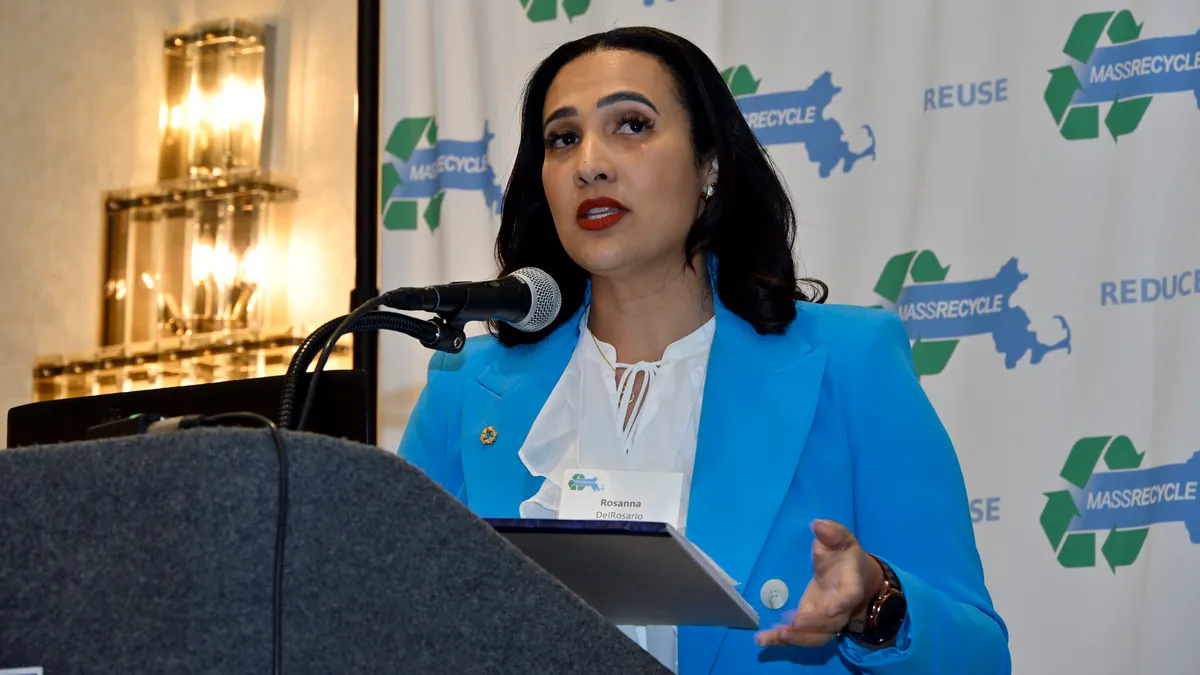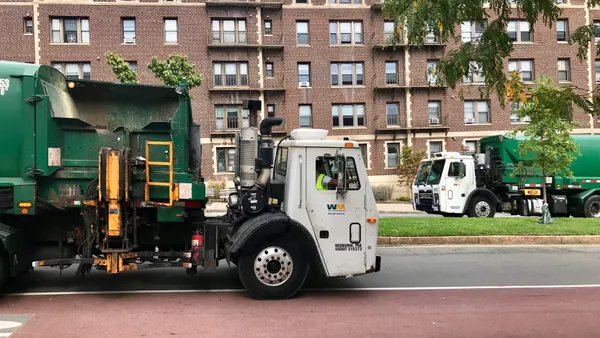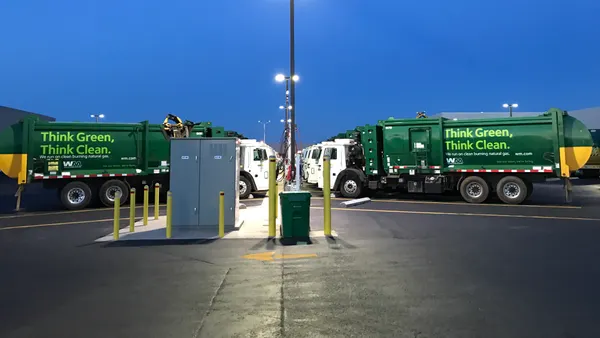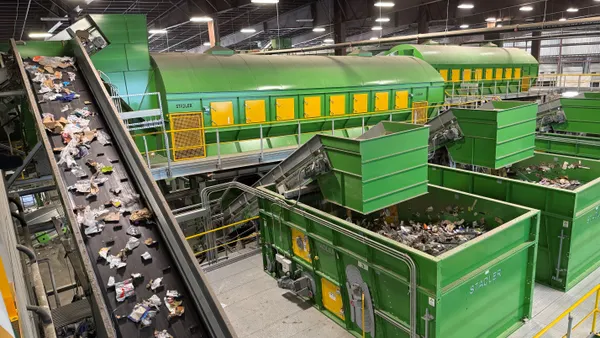Municipal and nonprofit officials at the annual MassRecycle conference highlighted how recycling efforts in Massachusetts have become better-established than those in many other states, but still have room for ongoing improvement.
"Relative to the rest of the country, Massachusetts has some really strong recycling programs,” said Cody Marshall, chief system optimization officer at The Recycling Partnership, during a keynote speech. The nonprofit’s latest report listed Massachusetts as having a 27% residential recycling rate, versus a 21% national average. But that still meant an estimated 752,000 tons of bottles, cans and paper are lost in the state each year.
MassRecycle, a nonprofit whose members include individuals from public and private-sector waste occupations, has been particularly focused on reinforcing public trust in recycling. President Gretchen Carey reported at the March 19 event that her group feels the narrative is starting to shift in local media coverage, in part due to an effort to facilitate more MRF tours. She also said the group recently decided to update its mission statement to better reflect issues such as waste reduction and climate change.
“While we are still called MassRecycle, the name chosen over 30 years ago, we are continuously expanding our scope to match the multitude of possibilities available in sustainable materials management,” said Carey. “MassRecycle absolutely believes in and promotes reduction, reuse, repair, rotting, repurposing, all the Rs, with recycling as the last opportunity for useful materials to have a second life.”
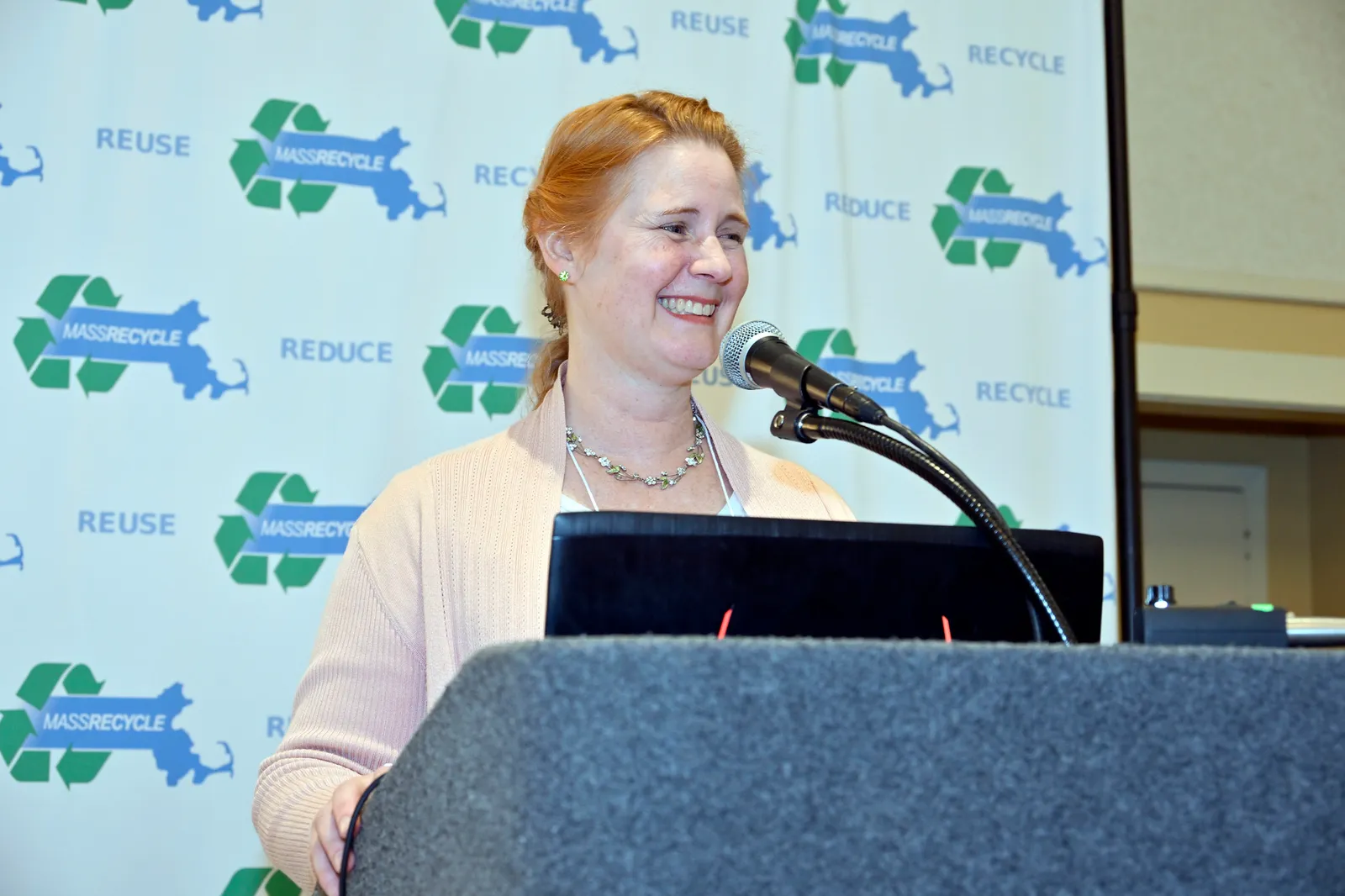
While Massachusetts has widespread curbside recycling access for many residents, and disposal bans for many types of recyclable materials, it still has gaps to address as part of the state’s 2030 waste reduction goals.
The report from TRP, a nonprofit backed by major CPG brands, showed 93% of the state’s single-family households have access to recycling via curbside pickup or drop off sites, but that number was only 48% for multifamily households. In many cases, municipalities in Massachusetts do not require multifamily recycling access.
More broadly, Marshall said the group’s behavioral research shows that in addition to access, elements such as trust and an emotional connection to recycling can influence behavior. He described a “clear belief-behavior gap” at play within the U.S., citing anecdotes about the many unique reasons people don’t fully participate in available recycling programs.
Looking ahead, Marshall said TRP is focused on areas such as improving packaging recyclability, growing access and supporting residents with the right information to help them participate. He described the effort as one that will require ongoing work from all stakeholders in the recycling system.
“There are no silver bullets. That's why you're in the room is because everyone needs to be at the table, all stakeholders. There's no technology that's going to solve this problem. We're not going to educate our way out of this,” he said. “No organization alone is going to solve it.”
Within the state, the Massachusetts Product Stewardship Council, a committee of MassRecycle, has been engaged in efforts to update recycling policy. Waneta Trabert, chair of MassPSC, said “we are sorely behind our neighboring states” when it comes to policies such as extended producer responsibility.
While the state has seen a flurry of product ban and EPR bills proposed, many of which remain in play ahead of the session ending in July, MassPSC is not optimistic about their chances. Trabert said the group is most focused on getting a paint EPR bill passed, though this will be a complex task because a standalone bill was recently combined with legislation about EPR for other materials.
"Our focus is on getting the paint bill language basically pulled back out of the new bill and to get that bill passed,” said Trabert, noting the best window to advocate for this could be in late April or early May.
In the meantime, recycling coordinators are focused on finding ways to reduce disposal volumes in their communities. This comes as capacity tightens in the region and costs continue to rise. Newer organics recycling programs were featured as one way to manage waste volumes, but the event also highlighted ways that local governments can optimize their existing recycling programs.
Lawrence was touted as one example of a community that has worked to push recycling education after rolling out new carts in recent years. Rosanna DelRosario, the city’s recycling coordinator, said that it’s important to have a creative and concerted education campaign in a multilingual community where many residents are often working multiple jobs.
"We don't have a limit when it comes to talking, we go out there. We and go talk to the residents door to door. We go to schools. We go to radio stations,” she said, noting a focus on churches and neighborhood meetings as well. Because the city has a large Spanish-speaking and Latin American population the staff also does outreach in different languages “because it's more convenient for us, it's more natural for us," DelRosario noted.
DelRosario said support has also come from the city’s mayor via social media posts and videos. A recent switch in hauling and MRF processing contracts makes it hard to compare data since the carts were introduced, but DelRosario said the city is seeing positive results. City staff also use requests for more trash containers as a way to educate residents about recycling.
"If you give them three containers for trash you're going to have to add a fourth one, because three is not going to be enough,” she said. “The less space you give to people to put trash, the less trash they will generate."
Efforts to optimize existing recycling and waste reduction programs also came up in a discussion about how to make the most of the state Department of Environmental Protection’s Recycling Dividend Program grants. Last fall, the state awarded $3.65 million in RDP grants based on a range of criteria, including environmental justice metrics.
Trabert, who is also the director of sustainable materials management for Newton, encouraged her peers to think about more ways to use these funds in case state budget decisions change in the future.
Newton has used funds to hire temporary staff to place stickers on recycling carts and post educational messages on social media. The city also used funds to update systems at its drop-off transfer station and swap shop, as well as fund materials for a lending library in partnership with the public library system. A new contract for public school teachers and staff also included provisions for “green team” members at each location, funded in part by RDP dollars.
"RDP is a fantastic program,” she said. "I think we may not all recognize how lucky we are to have this program.”



